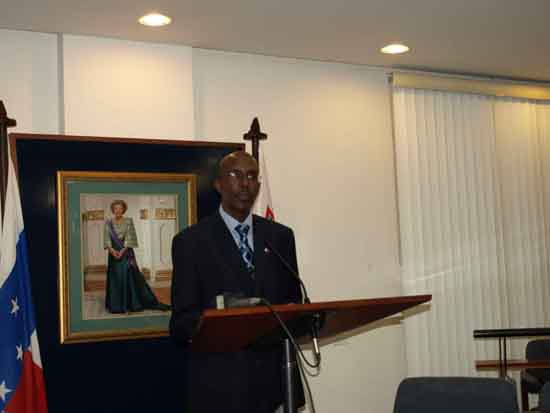 Philipsburg- This Kingdom Day, St. Maarten is to join communities in Holland and elsewhere in the kingdom, in hosting a naturalization ceremony as part of the process for non-nationals to obtain Dutch citizenship. The ceremony is slated to be held on Monday, December 15, at the Government Administration Building, starting at 4 p.m.
Philipsburg- This Kingdom Day, St. Maarten is to join communities in Holland and elsewhere in the kingdom, in hosting a naturalization ceremony as part of the process for non-nationals to obtain Dutch citizenship. The ceremony is slated to be held on Monday, December 15, at the Government Administration Building, starting at 4 p.m.St. Maarten is introducing the ceremony, taking into consideration that becoming a Dutch national is, indeed, a very special occasion, similarly as in the case in other countries, when non-nationals obtain citizenship. One known example of this is the U.S.
The idea for a naturalization ceremony is not new to Dutch municipalities and other territories of the kingdom. The naturalization ceremony was first launched in the Netherlands in 2001 by the then Minister for Urban Policy and the Integration of Ethnic Minorities. At that time, participation still took place on a voluntary basis. Municipalities in the Netherlands were also not obliged to organize a ceremony. In 2006, under former Minister for Immigration and Integration, Rita Verdonk, the ceremony became a compulsory part of the naturalization procedure in the Netherlands.
The Netherlands Antilles and Aruba are now to follow with implementation of the ceremony.
What is new to the procedure is a declaration of allegiance, to be administered to all new Dutch citizens in the Netherlands and on the islands.
In order to introduce this declaration, an amendment is being made to the Kingdom Law on Dutch Nationality [Rijkswet op het Nederlanderschap, RWN].
The aim of this new compulsory part is to emphasize the allegiance to the Netherlands - or if a person lives in one of the other countries of the Kingdom: the allegiance with that part of the Kingdom - and the democratic legal order.
It is expected to be a celebratory occasion, where the applicant is presented with a notification of the granting of Dutch citizenship.
The declaration of allegiance will therefore become a permanent part of the ceremony.
The purpose of the ceremony is to have new citizens feel more involved with their community and the kingdom of the Netherlands, fully appreciating the rights and obligations of all Dutch citizens.
The ceremony should be seen as a culmination of the integration process.
The ceremony additionally serves to have new Dutch citizens personally receive the royal decree confirming their attaining the Dutch nationality. At the celebratory ceremony, the governor of the island territory -- as representative of the crown -- is expected to address those present on, among others, the significance and implications of the Dutch nationality. The new Dutch citizens will also be welcomed into our community and invited to continue, as a good citizen, to make a positive contribution to the development of St. Maarten.
The compulsory nature of the ceremony is seen as an advantage and seeks to reiterate that the attaining of Dutch citizenship is a serious matter to which a great deal of value is attached. It is also to show that authorities attach great significance to the successful completion of this procedure.
It should be noted that this formal procedure is intended for everyone who becomes a Dutch national through option or naturalization.
The new Dutch citizens invited to the event are reminded that they will only become a Dutch national if they attend the naturalization ceremony. If they do not attend the ceremony, they will receive a new invitation for the next naturalization ceremony. The maximum period in which one has a chance to attend the ceremony is one (1) year. If one fails to attend the ceremony within that year, one has to redo the naturalization procedure.
New applicants are meanwhile being reminded of the procedures for the administering of the new naturalization test. This is one part of the naturalization process for foreigners residing in the Netherlands Antilles, and which came into effect as of the 1st of October, 2007.
Foreigners desiring to become a Dutch national must first take a naturalization test. Only after having passed the complete test, may the foreigner submit a request for naturalization.
The naturalization test in the Netherlands Antilles is focused primarily on testing one's knowledge of the community and the governmental structure, as well knowledge of the Dutch or English language.
Candidates must first be screened at the Bureau Local Chief of Police, located at the Sun color building, before qualifying to take the naturalization test.
After qualification the applicant then has to pay the required fees which have to be deposited in a special bank account. A proof of payment and the other requirements has to be provided to the Ministry of Education two weeks prior to the actual date of the test.
Persons who are in possession of their residency for five consecutive years without any gaps are qualified to apply for their Dutch Nationality. While persons who are married to a Dutch national will be considered after three years of the marriage as long as the couple lives together within the Dutch Territory. All applicants applying for the Dutch nationality has to meet the same criteria as stipulated by law.
Applicants must have common knowledge of the country and must be able to sing the St. Maarten song. Those applicants who are not able to sing the St. Maarten song will not obtain the Dutch Nationality.











